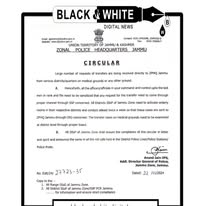Transfer Policy Circular Issued by Zonal Police Headquarters Jammu
J&K Zonal Police Headquarters Tightens Transfer Policy: Direct Requests Restricted, Proper Protocol Enforced
||Black and White Digital News ||
||November 23,2024 ||
JAMMU :In a significant move to streamline the transfer processes within the Jammu Zone police force, the Additional Director General of Police (ADGP), Anand Jain, IPS, has issued a circular outlining strict compliance measures for transfer requests. The directive aims to ensure that all transfer applications adhere to proper protocols and are routed through appropriate channels.
Key Highlights of the Circular
1.Restriction on Direct Requests:
The circular emphasizes that transfer requests from officers and personnel must no longer be sent directly to the Police Headquarters (PHQ) in Jammu. Instead, they are to be routed through the Senior Superintendent of Police (SSP) concerned.
2.Activation of Orderly Rooms:
– All District SSPs in the Jammu Zone have been directed to activate and conduct orderly rooms at least twice a week.
– These sessions will serve as platforms for addressing and reviewing transfer cases before forwarding them to Zonal Police Headquarters (ZPHQ) via the concerned DIG (Deputy Inspector General).
– Transfer requests citing medical reasons must undergo a thorough examination at the district level.
– A proper medical board will be constituted to evaluate the authenticity of such cases.
4.Communication and Enforcement:
– District SSPs have been instructed to ensure widespread dissemination of the circular’s provisions.
– The guidelines must be announced during roll calls held in District Police Lines, Police Stations, and Police Posts.
– The ADGP has mandated strict adherence to these procedures in both letter and spirit.
Eliminate Bureaucratic Overload: By routing all requests through proper channels, the PHQ aims to reduce the influx of direct applications, ensuring a more organized approach.
– Enhance Accountability: The involvement of SSPs and DIGs ensures greater scrutiny and accountability at the district level.
-Streamlined Medical Cases: The medical board evaluation prevents misuse of medical grounds for personal benefits.
-Improved Communication: Regular orderly rooms provide personnel with a formal mechanism to voice grievances and seek redressal.
Implications for the Police Force:
-Organizational Discipline: The directive reinforces a hierarchical structure, fostering discipline and procedural compliance.
-Efficiency in Decision-Making: A tiered process ensures that only genuine cases are escalated to higher authorities.
-Enhanced Morale: Transparent and structured processes may improve trust and morale among personnel.
Challenges and Considerations:
-Implementation Hurdles: Ensuring consistent adherence across all districts may require close monitoring.
-Timely Addressal of Cases: Delays in orderly room sessions or medical board reviews could lead to dissatisfaction among personnel.
-Awareness and Training: Effective communication and training may be needed to educate officers and staff on the updated protocols.
This circular represents a crucial step in streamlining internal administrative processes within the Jammu Zone police force. By emphasizing proper channels, accountability, and transparency, the ZPHQ aims to enhance operational efficiency and maintain organizational discipline. However, successful implementation will depend on consistent monitoring and timely execution at all levels of the police hierarchy.




